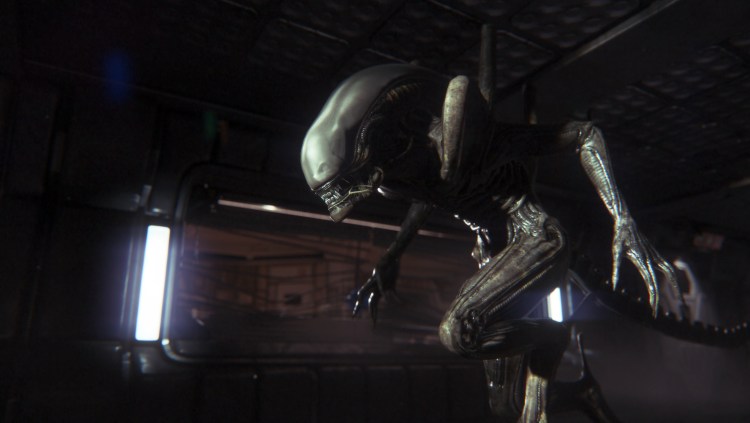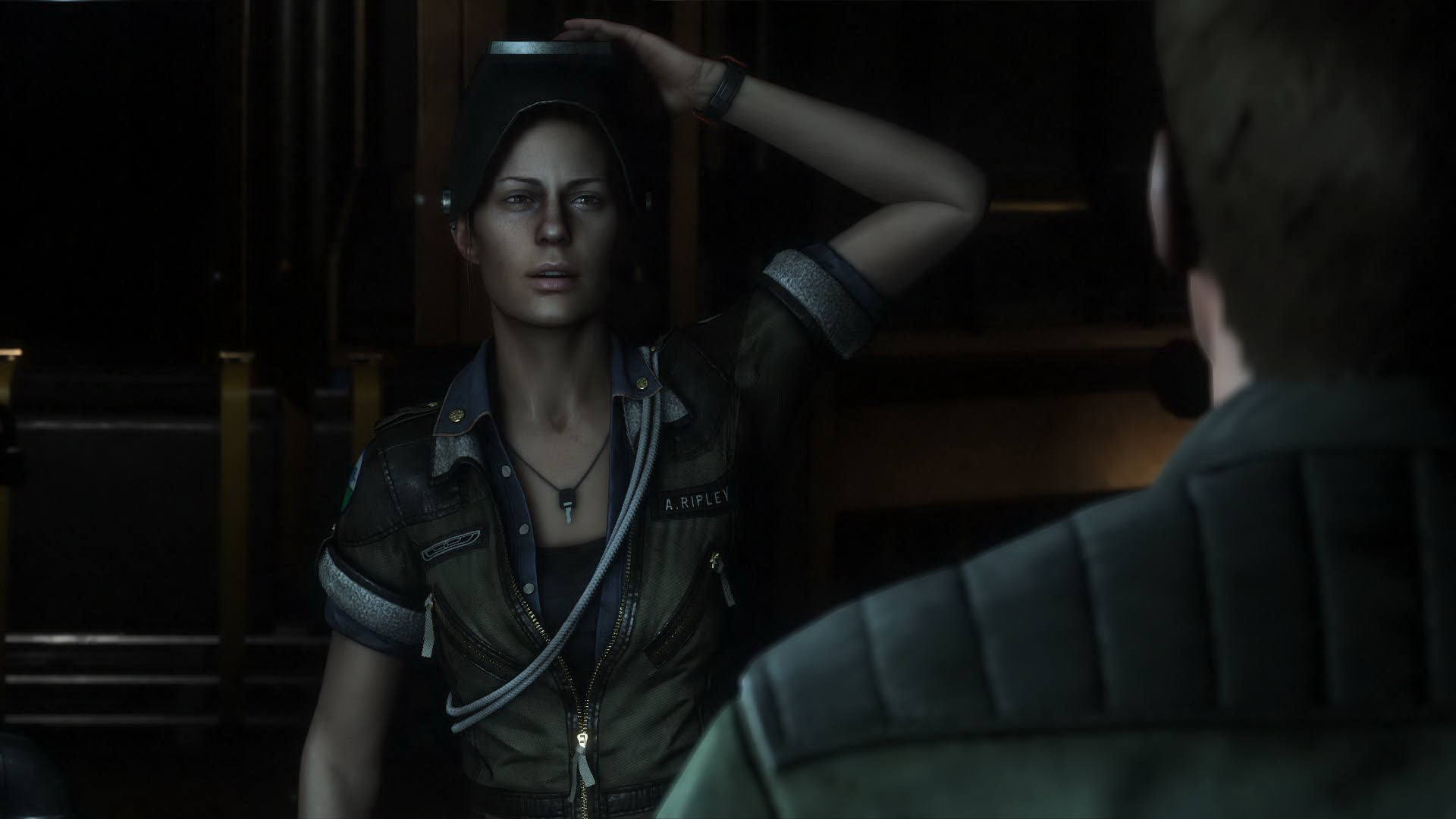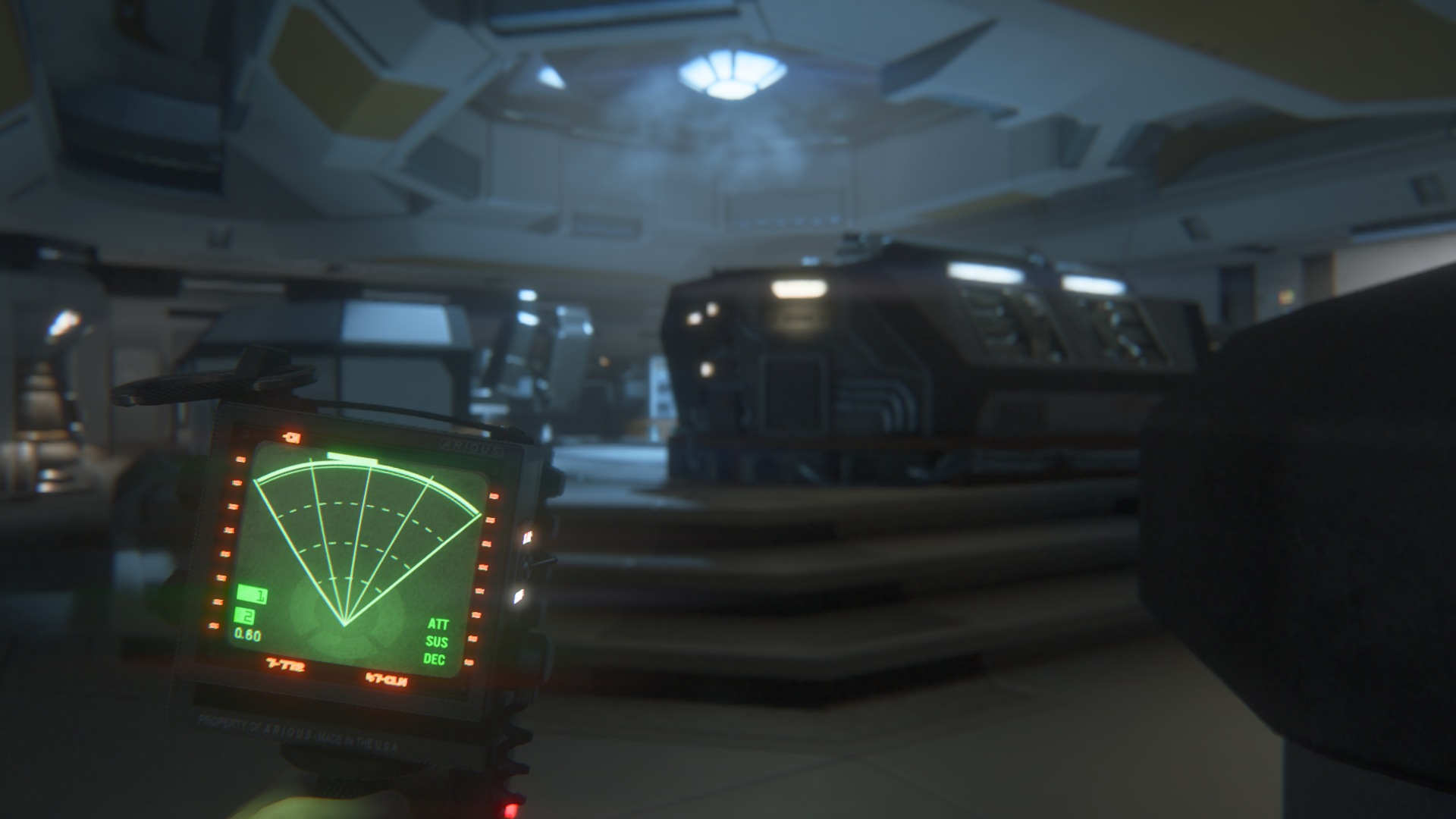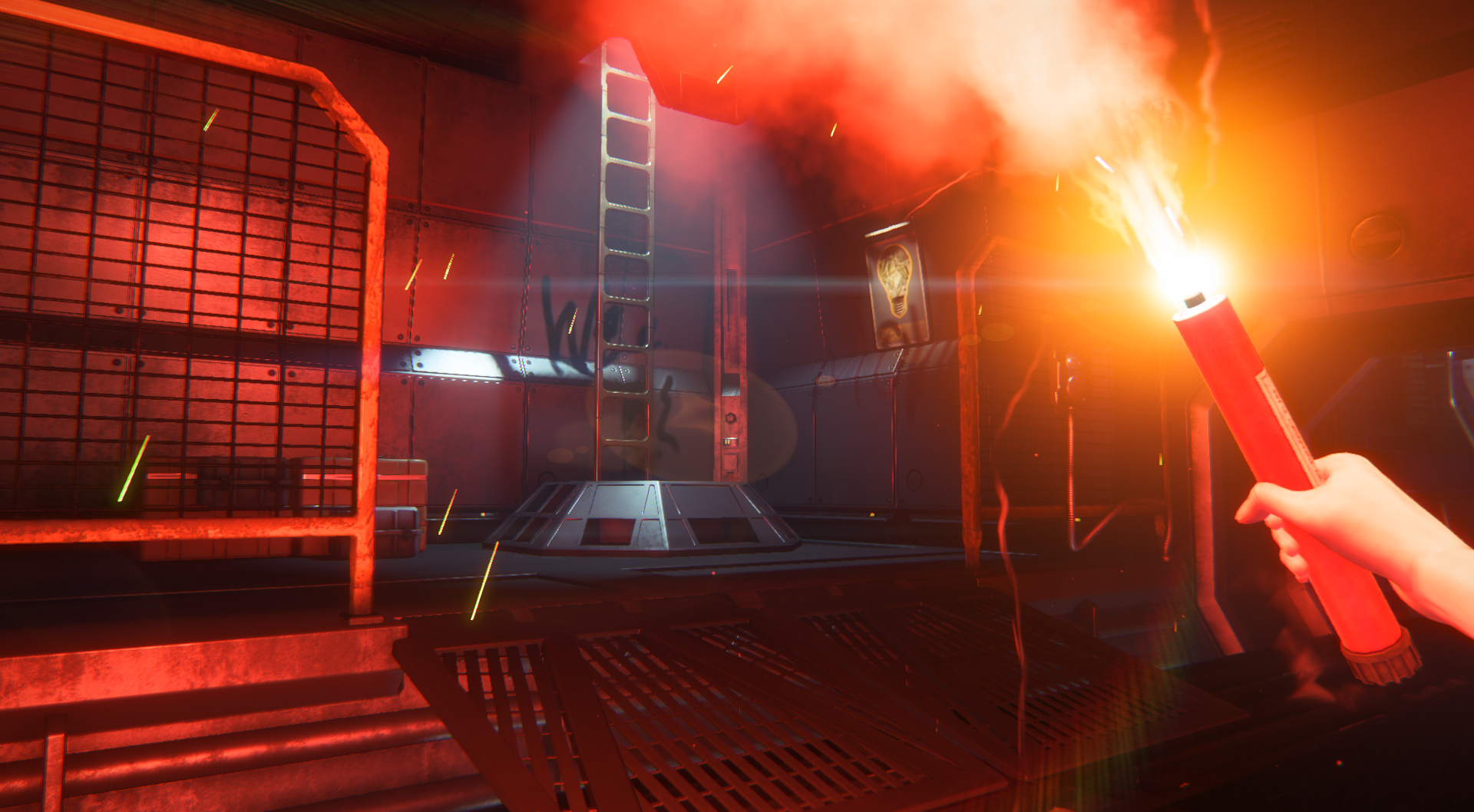Check out our Reviews Vault for past game reviews.
Alien: Isolation is the best merciless game of 2014.
Even in a year that includes the punishing Dark Souls II, this is an Alien game that tests the limits of your patience and makes you pay dearly for the slightest mistakes. At least you can study the actions of the enemies in Dark Souls II — and then counter them. Based on my Xbox One playthrough, the xenomorph in Alien: Isolation moves, stalks, and hunts with enough unpredictability to make your teeth grind while you’re cowering under a table or inside a cramped storage cabinet. While you wait for the alien to give up, you can kill time by admiring the visual handiwork of game studio The Creative Assembly. Alien: Isolation is a convincing effort that makes this a suitable extension of the world Ridley Scott and his crew conceived in the 1979 Alien movie.
The Creative Assembly’s love and reverence for Ridley Scott’s film is apparent right from the deliberately distorted opening logos. These visual nods continue well into the first few minutes of exploring the initial space vessel, right down to the white puffy walls and the abundance of steam coming out of pipes in the hallways. Whether you have a strong photographic memory or not, rewatching Alien prior to playing Alien: Isolation is a good idea, if only to appreciate the game’s level of detail.
Ripley, believe it or not
The opportunity to play as Ellen Ripley’s daughter, plus all of the production values that directly reference the movie, provides more than enough fan service. Alien: Isolation shows respect for the source material, wisely avoiding Gearbox Software’s absurd and insulting plot twists from Aliens: Colonial Marines. No resurrection this time — Amanda Ripley owes much of her existence to a deleted scene from James Cameron’s Aliens, so her appearance here doesn’t feel entirely random. Her motivation is equally sensible: The flight recorder from her mom’s missing ship turned up, compelling Amanda to join a small crew on a retrieval mission. Getting closure is a good a motivator as any. You can see how it provides a convincing narrative foundation, one that Creative Assembly adeptly uses as a jumping-off point.
Alien: Isolation follows the classic “don’t go in the barn” horror movie troupe. In Ripley’s case, the “barn” is Sevastopol Station, a space-faring supply depot. It’s an effective setting that emulates the single-creature threat from Alien without actually copying the movie scene for scene. In a playthrough that can range from 15 hours to 20 hours, Isolation easily carves an identity all its own even if the fan service is pervasive.
The one stumbling point is a mid-game interlude that is also a flashback. Without spoiling anything, the chapter is the most ham-fisted form of fan service in Isolation. For a widely respected series like Alien, this extended scene’s inclusion is understandable, but it’s not needed. It feels even more unnecessary if, surprisingly enough, you’ve had the misfortune of playthrough Aliens: Colonial Marines, a game that pummels you with fan service like an out-of-control synthetic human.
Speaking of synthetic humans, Sevastopol Station is full of androids known as “Working Joes,” and yes, practically all of them are out to kill you. Think of them as similar to the xenomorph except that they’re much slower. Compared to Ash in the film, the Joes’ mannequin-like appearances make them easy to distinguish between actual humans, though that doesn’t make them look any less frightening.
You’re already dead
Revolvers can be effective against the Joes, but not so much with the alien. If you have enough time to make eye contact with creature, you’re about one second away from dying. It doesn’t take long to adapt to the environments and use the area to your advantage. You’re welcome to use your stealth skills to assault unruly humans with loud, fatal melee blows; you just have to be ready to scurry under an operating table or sprint toward the nearest locker. Isolation rewards having presence of mind and awareness of your surroundings.
Presented in the first-person, moving and assessing a level in Isolation undetected is similar to the amusing camera design of Dishonored. The act of peeking gives the impression that everything above your eyes should be visible to nearby foes; yet somehow, you’re still a ghost. This is not a criticism; Alien: Isolation is one of those experience where I’ll take any edge I can get. These advantages also extend to the enemies’ line of sight. I never managed to grasp a 100 percent consistent feel for what nearby hostilities can or can not see. You can break line of sight by crouching on one side of a meeting room table even if you have a clear view of the person on the other side of the table. Just be sure you’re not in a situation where you need to move quickly, as Isolation lacks a sprint-crouch option.
One of the loading-screen tips reminds the player that even a seemingly safe locker does not offer complete safety from the alien. Indeed, much like sneaking, it was hard to trust the seemingly consistent effectiveness of lockers. If the alien’s face is right up against the locker you’re hiding in, a two-button prompt will appear: one to hold your breath, another to lean back. In the dozen or so attempts to follow these directions, I did not survive once, which defeats the purpose of having these control tips to begin with.
Whether it’s the choice to run, hide, walk, having to make these perpetual judgment calls provide much of the game’s intense and rush-inducing moments. Running down a series of hallways will almost always alert the xenomorph. If you have the patience to simply walk at your fastest speed, you might be better off. At least you’ll have access to a motion-tracker in case there are hostiles other than the alien. Even if you play by rules of stealth, it’s occasionally not enough. I died during a handful of escape sequences simply because I wasn’t paying attention to the open ceiling vents, so stay away from any such passages — especially when alien drool is dripping unto the floor.
Beyond a blunt-force weapon, Sevastopol’s modest resources scattered throughout the base offer just enough parts and scrap as adequate ingredients for practical items like med kits and pipe bombs. You have a finite amount of slots in which to hold these resources, which makes massive stockpiling impossible. Stockpiling was an issue in many mid-2000s survival horror games. Not knowing when the game would end would force some players to become ultra-conservative with their item use. Before you know it, you’re able to take down the final boss in 10 seconds and you’re left with tons of unused items and weapons. Having limited item slots not only forces you to use your items regularly, but it also promotes experimentation. Using a noisemaker to lure the alien away from you is one thing; it’s another to use a noisemaker to point the alien in the direction of other humans.
Doing more with less
Alien: Isolation is a game of limited options, not just with items but also in terms of how to approach a situation. Just like The Last of Us, Alien: Isolation’s leanings toward zero-detection stealth contrasts with the ambitious play-as-you-like designs of other sneaky adventure games like Thief and Splinter Cell: Blacklist. It doesn’t take long to look on the bright side and just be grateful that The Creative Assembly presented you with options at all. Most of these opportunities are revealed through general exploration, use of the maps, and experimentation. Once you know what the androids can or cannot withstand, now you know what you’re up against. How does that affect which items to craft next? Are you still better off sneaking past an android even if it’s a significant time investment with no assurances you’ll make it to the next save point?
You’re always making judgment calls, and it’s a situation that’s more complicated thanks to the often challenging placement of save points. Sure enough, these save points are more accessible during the very few moments of respite and less so when you have to deal with both the alien and the androids. Given the frequent anxiety in trying to reach, let alone find, save point, I can’t help but think The Creative Assembly put a lot of careful thought into these locations.
Beyond tools, save points, and modest firearms, you absolutely cannot underestimate the importance of Alien: Isolation’s sound. Just like the art direction, the music offers the same kind of fan-pleasing connective tissue to Ridley Scott’s film. The only sounds more menacing than the noise of the alien traversing the vents are the thumping steps as it roams the hallways. The sounds of these footsteps are based on a given floor surface and distance from the player. Use headphones or a home theater system; relying on your TV’s modest speakers will deprive you one of the best game audio experiences in recent years. It does have a couple of moments where both the sound and music were conflicting with each other, where I was confusing the ambient qualities of the score with environmental noises. I doubt this was what the studio intended, and these were issues that did not detract from my overall enjoyment of Isolation.
Conclusion
Alien: Isolation is still well rounded and comprehensive in its reverential use of the original 1979 film, even with its shortcomings. I cannot imagine any future Alien game attempting a similar feat with the same level of success. While the interlude made me question whether you can have too much fan service, I respect this kitchen-sink approach from The Creative Assembly. This sense of completeness is all the more affirmed by the DLC featuring the movie’s original cast (which I have yet to evaluate). Alien: Isolation’s ideal for those with the patience to deal with unpredictable behavior of the alien and who accept the inevitability that you will die once in a while through no fault of your own.
Score: 83/100
Alien: Isolation is out on Oct. 7 for the PlayStation 4, Xbox One, PlayStation 3,Xbox 360, and PC. Sega provided GamesBeat with a digital Xbox One copy of the game for the purposes of this review.
VentureBeat's mission is to be a digital town square for technical decision-makers to gain knowledge about transformative enterprise technology and transact. Learn More






